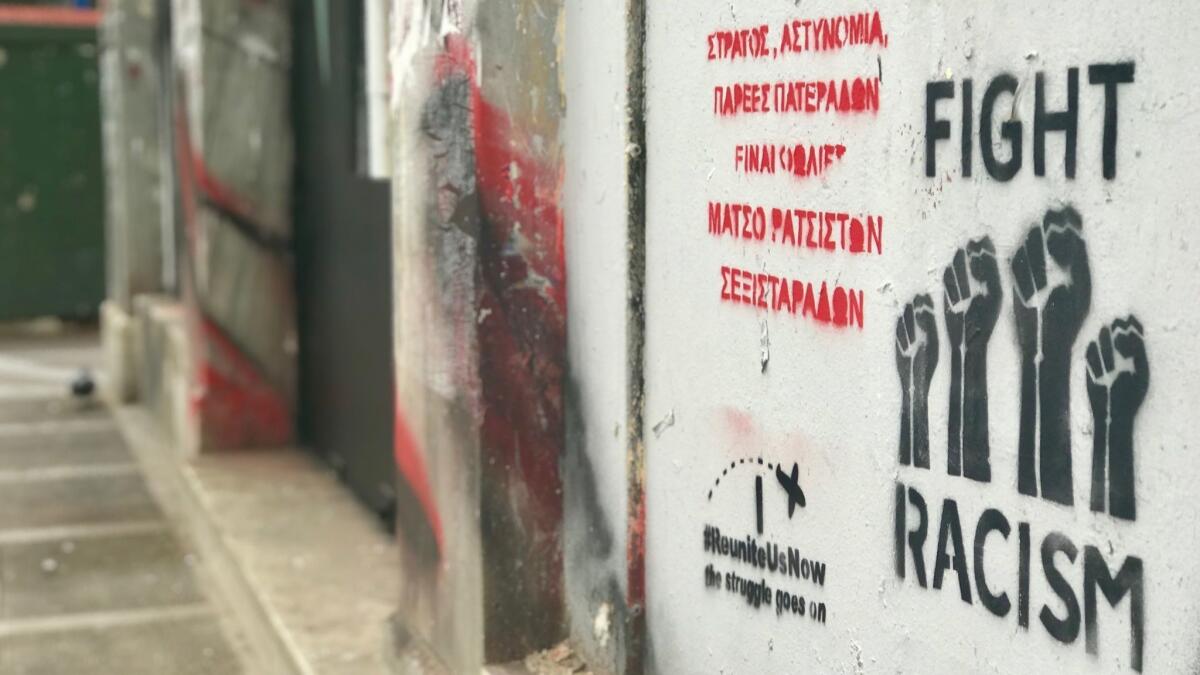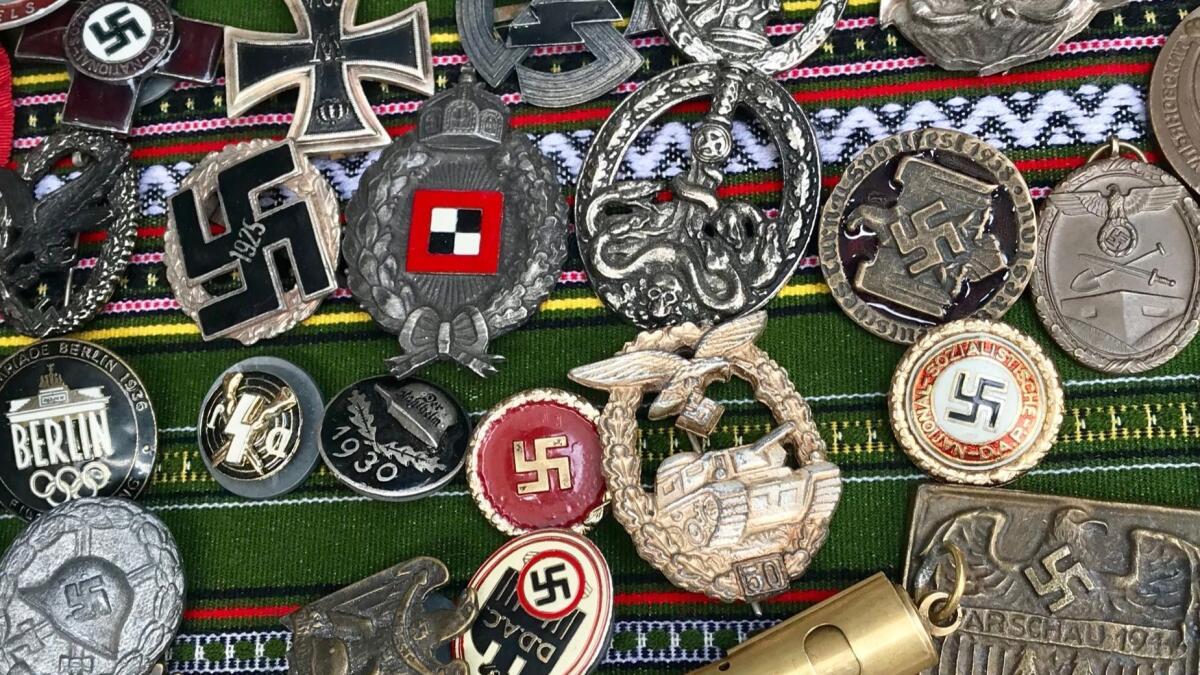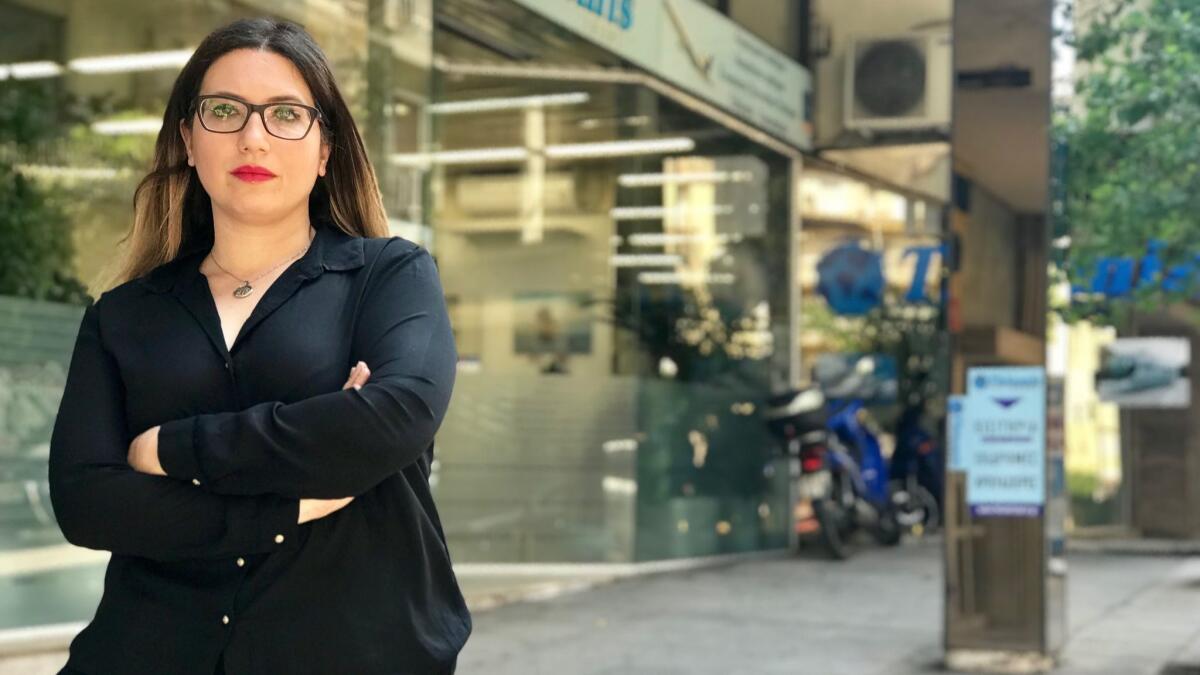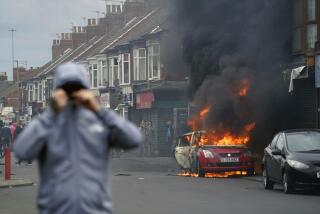A surge in neo-Nazi attacks terrifies refugees in Greece

- Share via
Reporting from Athens — The office of the Afghan community center in Athens smelled like soot. Papers lay scattered on the floor. Mokhtar Rezai touched the singed paint on the door where a neo-Nazi group reportedly set fire to the office in a gasoline-fueled attack this spring.
Although no one was injured in the incident, the attack has contributed to an atmosphere of fear for many members of Greece’s foreign-born community.
For the record:
12:25 p.m. June 4, 2018An earlier version of this article said there were 102 violent incidents involving foreigners in Greece last year. Not all the incidents involved foreigners.
“This was an attack against all foreigners in Greece,” Rezai said during a recent interview. “They were sending a message that we are not welcome here.”
The attack was part of a surge in assaults in Greece by far right and neo-Nazi groups against refugees and others. The country has been the port of entry for hundreds of thousands of refugees and other migrants from Syria and elsewhere in recent years, and tens of thousands have stayed. Meanwhile Greece is struggling to emerge from a long economic downturn that has left it with one of the highest unemployment rates in Europe.

There were 102 incidents of racism-related violence, including many involving foreigners, in Greece last year, up from 95 the year before, according to a report by the Racist Violence Recording Network, a U.N.-backed Greek human rights group. But the attacks recorded in the report are “only the tip of the iceberg,” said Tina Stavrinaki, a spokeswoman for the group.
“Many victims are hesitant to report attacks. They are worried that they might jeopardize their legal status as immigrants or refugees or be subject to retribution,” she said in an interview in her Athens office.
With the urging of nongovernmental organizations, the Greek government has established a police agency tasked with combating racial violence. New laws also protect immigrants who arrive without documents from being deported while their case is being heard.
Rezai, who works as a translator in the community center office that was attacked, said he was out to lunch when the attack took place. The Afghan community was already worried about violence after previous attacks. To keep a low profile, the office had no sign on the door. Nevertheless, a group of men came to the small office on the fifth floor, poured gasoline and lighted a fire that spread through the room, burning vital records.
“The fact that this could happen in Europe is terrifying,” said Rezai, who fled Afghanistan at the age of 15 and showed a scar on his head that he said had been left by shrapnel.
A neo-Nazi group calling itself Krypteia later claimed responsibility for the attack, according to Afghan community leaders and news reports. The Athens police department did not return calls seeking comment.

In some cases, such as the attack against the Afghan center, the attackers responsible identify themselves as part of a far-right group. In other cases, no claims are made and police investigations are often inconclusive. And determining who is responsible for attacks against immigrants can be difficult.
Observers point to far-right groups as the source of many attacks. In March, Greek anti-terror police arrested five men and accused them of being part of a different neo-Nazi group, called Combat 18-Hellas, according to news reports. Police seized ingredients that could be used to make explosives and other weapons.
As fear rises, immigrants have taken defensive measures. Taher Alizadeh, the head of the Afghan community center, warns Afghans not speak their native languages in public and instead learn to speak Greek.
“They need to be careful when they walk in the streets and not to draw attention to themselves,” he said through a translator during an interview at the new home of the Afghan community center in a small office in central Athens. Alizadeh said he chose to locate the new center in a building that houses other immigrant-aid groups as a form of protection.
Women are particularly vulnerable, Alizadeh said. Afghan women are sometimes choosing not to wear hijabs, the traditional Muslim head coverings, so as not to draw attention to themselves. Recently, some women were told to stop speaking Farsi on a bus and had their hijabs pulled off, he said. Rezai said that Afghan women who wear the hijab in the street in Athens are often verbally abused.
It’s not only the Afghan community that is afraid. Many of the refugees and immigrants in Greece are from other predominantly Muslim countries such as Syria. Naim el Ghandour, president of the Muslim Assn. of Greece, said that recent attacks have left all Muslims feeling vulnerable.
“This is a great threat and people are very fearful,” he said through a translator. El Ghandour said he recently received a phone call in which the caller, who identified himself as a Krypteia member, threatened to “burn and torture” him. He said he filed a complaint with police.
In response to the violence, Muslims have been buying surveillance cameras for their homes and cultural centers and hiring guards, El Ghandour said. “We have to spend money on these things when we don’t have a lot of money,” he added.
Some community leaders expressed doubts about how much protection the police offer foreign-born residents.
El Ghandour said that many police officers don’t intervene when they witness attacks against refugees. “There are incidents on the street or on buses when Muslims are insulted and nothing happens, even though the police witness the incident,” he said.
Greece’s continuing economic problems have contributed to the rise of far-right groups, observers say. The country’s unemployment rate has been hovering around 20%. Although the economy has improved in recent years, the country is still reeling from the financial crisis and violent protests are common in Athens.
All that has made the ground fertile for the rise of the far right, Vasiliki Georgiadou, a political science professor at Panteion University in Athens, wrote in an email.
The ultranationalist political party Golden Dawn, which has won seats in parliament, is inspiring attacks through its xenophobic rhetoric, said Anastasia Kafe, an adjunct lecturer at Panteion University in Athens.
“The increase in refugees in Greece is a political opportunity for Golden Dawn and other extreme-right groups,” Kafe said in a phone interview. “Many people in Greece are afraid of the refugees, and Golden Dawn is playing on this fear.”
Georgiadou is among those who describe Golden Dawn as a neo-Nazi party based on its racist ideology, use of Nazi symbols and praise of Nazi leaders.
Matthaiopoulos Artemios, a former member of parliament for Golden Dawn and a spokesman for the party, said in a phone interview that “there is no evidence that any member or supporter of Golden Dawn has used violence against an immigrant.” He described Golden Dawn as a “patriotic organization” and said the party is “100% against violence.” He added that it is immigrants who are violent, and the “the Greek people should be able to use any means to protect themselves when threatened.”
Artemios also denied that Golden Dawn is a neo-Nazi organization. He insisted that Golden Dawn uses only symbols from ancient Greece, not Nazi Germany. He acknowledged having been a member of a neo-Nazi punk band that played anti-Semitic lyrics but said that it “was just a group I played with in 2005; I’m not responsible for the lyrics.”
Neo-Nazi groups aren’t limiting their attacks to refugees. Eleftheria Tompatzoglou, who is ethnically Greek, was among five people injured during a recent attack on a social service center for immigrants in the port city of Piraeus, near Athens.

Tompatzoglou is one of the lawyers representing the family of Pavlos Fyssa, an activist who was allegedly stabbed to death by a Golden Dawn member. She said she was attending an event at the social service center in February when a group of six people dressed in black rushed through the door wearing motorcycle helmets and holding crowbars and torches.
“They were shouting, ‘Today you are going to die’ and ‘You can’t have this place in Piraeus,’” she said.
“They grabbed tables and chairs and started throwing them at us,” she said. “One of them started hitting me with a crowbar. ... Some of the other attackers threw torches that were lit. I was afraid the building was going to catch on fire. I tried to open a window to get out and then one of them hit me on the head.”
She said she needed seven stitches for a scalp wound.
“The situation here is terrifying,” she said. “The one thing we can be sure of is that there will be more attacks.”
Brodsky is a special correspondent.
More to Read
Sign up for Essential California
The most important California stories and recommendations in your inbox every morning.
You may occasionally receive promotional content from the Los Angeles Times.













